German film actor Horst Frank (1929–1999) appeared in more than 100 films between 1955 and 1999. During the 1960s he was the blond, steely-eyed bad guy of countless Spaghetti Westerns and Eurospy films.
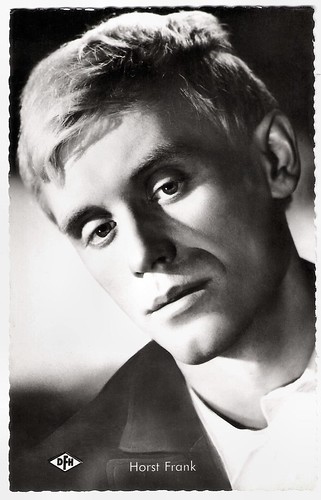
German postcard by Kolibri-Verlag G.m.b.H., Minden/Westf., no. 192. Photo: DFH. Publicity still for Der Greifer/The Copper (Eugen York, 1958).
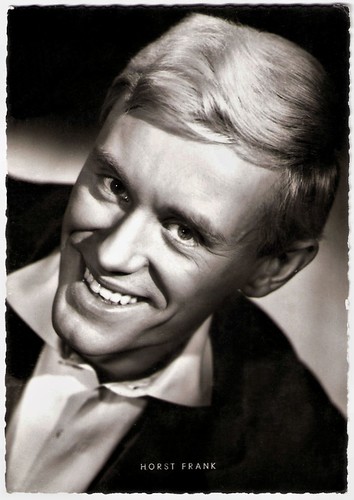
German postcard by IRMA-Verlag, Stuttgart-W, no. 1523. Photo; Kurt Ulrich Film / DFH / Wesel. Publicity still for Der Greifer/The Copper (Eugen York, 1958).
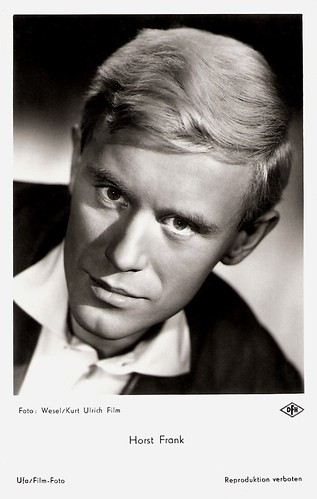
German postcard by Ufa, Berlin-Tempelhof, no. FK 3991. Photo: Wesel / Kurt Ulrich Film / DFH. Publicity still for Der Greifer/The Copper (Eugen York, 1958).
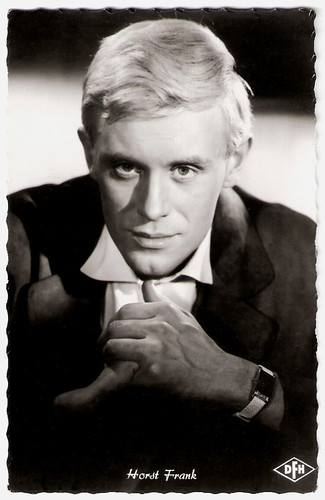
German postcard by Kolibri-Verlag, Minden/Westf., no. 135. Photo: Kurt Ulrich Film / DFH / Wesel. Publicity still for Der Greifer/The Copper (Eugen York, 1958).
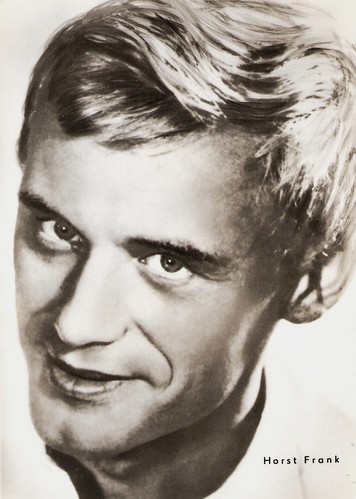
East-German postcard by VEB Progress Film-Vertrieb, Berlin, no. 192/71. Photo: Steffen.
Horst Bernhard Wilhelm Frank was born in 1929 in Lübeck, Germany, the son of a porcelain painter. After graduation, he completed an apprenticeship as a trader. He then enrolled in the acting class at the Musikhochschule Hamburg (Music Academy Hamburg) but failed his final exams. Nonetheless, he managed to secure an acting position in his hometown, but his work was primarily confined to small parts on stage and radio. In Baden-Baden, he joined the Südwestfunk ensemble and started working for television. He made his film debut as a cynical, cowardly pilot in the West-German war film Der Stern von Afrika/The Star of Africa (Alfred Weidenmann, 1957), portraying the combat career of a World War II Luftwaffe fighter pilot Hans-Joachim Marseille (Joachim Hansen). The film was successful at the German box office.
Frank then won a critic's award for his next role as a member of a U-boat crew in the war drama Haie und kleine Fische/Sharks and Little Fish (Frank Wisbar, 1957). Next he played supporting parts in such West-German productions as the crime film Der Greifer/The Copper (Eugen York, 1958) starring Hans Albers, Das Mädchen Rosemarie/Rosemary (Rolf Thiele, 1958) featuring Nadja Tiller, and the war film Hunde, wollt ihr ewig leben/Dogs, Do You Want to Live Forever (Frank Wisbar, 1959). I.S. Mowis at IMDb: “Of athletic, lithe build and owner of a somewhat cold, hypnotic gaze (with a voice to match), Frank soon found himself typecast to disturbingly good effect as psychotic murderers in German and international productions”.
In Italy, he appeared with Massimo Girotti in the drama Lupi nell'abisso/Wolves of the Deep (Silvio Amadio, 1959), and in France with Françoise Arnoul in the war drama La chatte sort ses griffes/The Cat Shows Her Claws (Henri Decoin, 1960) and with Laurent Terzieff in Tu ne tueras point/Thou Shalt Not Kill (Claude Autant-Lara, 1961). From 1961 to 1963 he lived in Tanganyika on his own farm and raised coffee and vegetables. Political turmoil forced him to return to Germany. Frank appeared in several pan-European productions, such as the French-Italian-German crime comedy Les Tontons flingueurs/Crooks in Clover (Georges Lautner, 1963) with Lino Ventura, and the German-French-Italian Eurowestern Die Flußpiraten vom Mississippi/The Pirates of the Mississippi (Jürgen Roland, 1963) starring Hansjörg Felmy and Brad Harris.
He was also in the German-French-Italian spy film Die Diamantenholle am Mekong/Mission to Hell (Gianfranco Parolini, 1964) starring Paul Hubschmid. It was one of the first Eurospy productions and a box office hit. In Italy, he proved to be an ideal henchman in the Spaghetti Western Le pistole non discutono/Bullets Don't Argue (Mario Caiano, 1964). Jolly Film produced the film back to back with Sergio Leone's Per un pugno di dollari/A Fistful of Dollars (1964) but with a more expensive budget. The producer expected it a greater success than Leone's film, especially because lead actor Rod Cameron was better known than Clint Eastwood.
Frank appeared in several other Eurowesterns and Eurospy films. Most are mediocre, but the Spaghetti Western Preparati la bara!/Django, Prepare a Coffin (Ferdinando Baldi, 1968) with Terence Hill in the title role is interesting. Django was previously played by Franco Nero in Sergio Corbucci's original Django (1966). Django, Prepare a Coffin is unique among the films capitalising on Corbucci's hit. It was a semi-official, legitimate follow-up, and Franco Nero was meant to star. Curious is also Quella sporca storia nel West/Johnny Hamlet (Enzo G. Castellari, 1968), a Spaghetti Western version of William Shakespeare's 'Hamlet'.
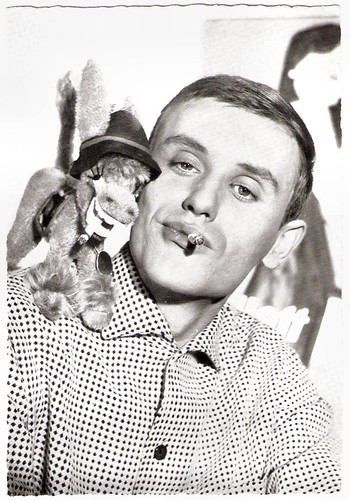
German postcard by WS-Druck, Wanne-Eickel, no. 372.
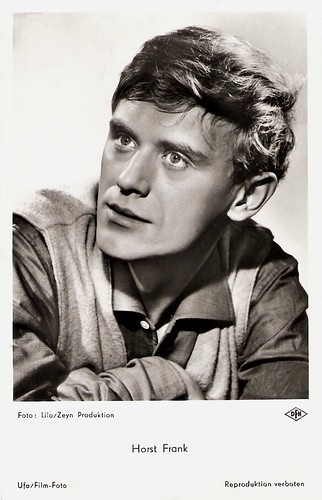
German postcard by Ufa, Berlin-Tempelhof, no. FK 3781. Photo: Lilo / Zeyn Produktion / DFH. Publicity still for Haie und kleine Fische/Sharks and Little Fish (Frank Wisbar, 1957).
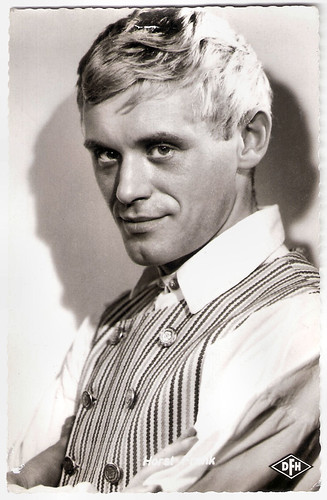
German postcard by Kolibri-Verlag G.m.b.H., Minden/Westf., no. 346. Photo: Real / DFH / Lilo. Publicity still for Das Mädchen vom Moorhof (Gustav Ucicky, 1958).
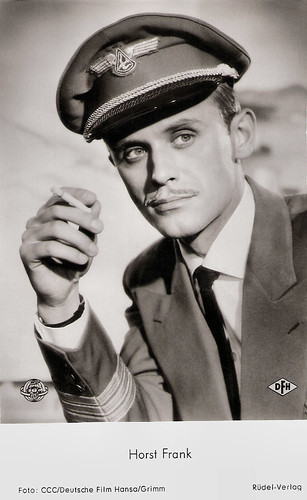
German postcard by Rüdel-Verlag, Hamburg-Bergedorff, no. 2866. Photo: CCC / Deutsche Film Hansa / Grimm. Publicity still for Abschied von den Wolken/Rebel Flight to Cuba (Gottfried Reinhardt, 1959).
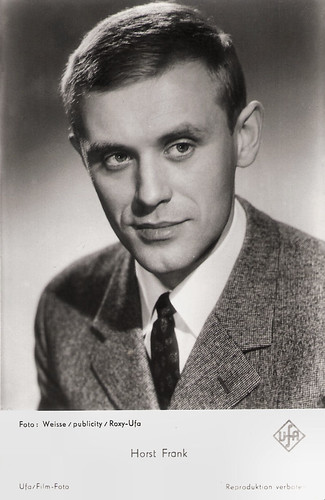
Austrian postcard by HDH-Verlag (Hubmann), Wien, no. 346. Photo: Weisse-Publicity / Roxy / Ufa. Publicity still for Bumerang/Cry Double Cross (Alfred Weidenmann, 1960).
During the 1970s, Horst Frank often played ruthless killers and impassive assassins in Italian genre films, including the Giallo Il gatto a nove ode/The Cat o' Nine Tails (Dario Argento, 1971). This is the middle entry in Argento's so-called Animal Trilogy along with L'uccello dalle piume di cristallo/The Bird with the Crystal Plumage (1970) and 4 mosche di velluto grigio/Four Flies on Grey Velvet (1972).
Frank also worked regularly in Germany. An example is the television film Carlos (1971) for which director Hans W. Geissendorfer transplanted the story of Friedrich Schiller's play 'Don Carlos' from 16th-century Spain to a 1915 American Western-style environment.
From 1973 on, Frank frequently worked in the theatre, touring with productions of plays by Noel Coward and Peter Ustinov, and often worked for German television. He guest-starred in several episodes of the popular Krimi series Der Kommissar, Tatort and Derrick, and also starred in the miniseries Timm Thaler/The Legend of Tim Tyler: The Boy Who Lost His Laugh (Sigi Rothemund, 1979). Incidentally, he appeared in interesting films such as the Science-Fiction film Operation Ganymed (Rainer Erler, 1977) about a spaceship which returns to Earth after several years of space exploration and finds it desolate. Another highlight was the TV film Wege in der Nacht/Ways in the Night (Krzysztof Zanussi, 1979) with Mathieu Carrière.
In addition to his screen acting, Frank lent his voice to dubbing work for fellow tough guys like Jack Palance, Ernest Borgnine and Chuck Connors. On the radio, he voiced Captain Nemo in 20,000 Leagues Under the Sea and The Mysterious Island. I.S. Mowis: “Behind the menacing heavy, there was a family man and author of poems and chansons. (…) Likely because of his lack of work in major American or British productions, Frank never quite achieved the international recognition he undoubtedly deserved.”
Among his last screen credits were the romanticised TV biography Catherine the Great (Marvin J. Chomsky, John Goldsmith, 1996) with Catherine Zeta-Jones as Empress Catherine II, and Die Menschen sind kalt/People are Cold (Andreas Dorau, 1998). In 1999, Horst Frank quite suddenly died of a brain haemorrhage, just short of his 70th birthday. He had a son from his first marriage and a daughter named Désirée from his second marriage to actress Chariklia Baxevanos. From 1979 till his death, he was married to actress Brigitte Kollecker.
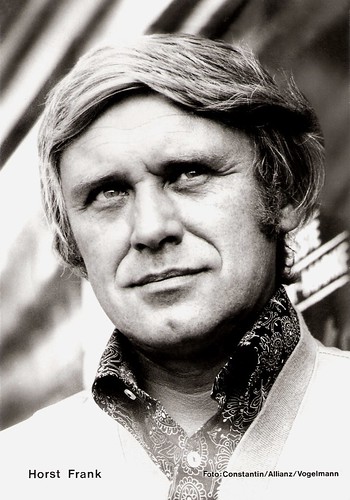
German postcard by Rüdel-Verlag, Hamburg. Photo: Constantin / Allianz / Vogelmann. Publicity still for Fluchtweg St. Pauli - Großalarm für die Davidswache/Hot Traces of St. Pauli (Wolfgang Staudte, 1971).
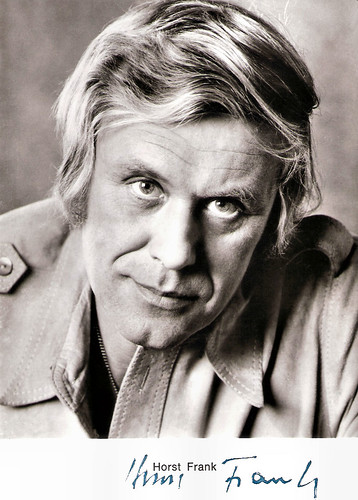
German postcard by Franz Josef Rüdel, Filmpostkartenverlag, Hamburg. Photo: Sessner, Dachau.
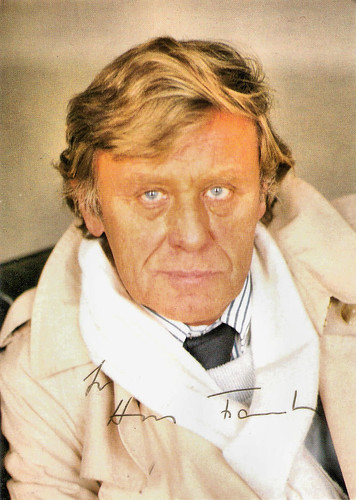
German autograph card by Büro für promotion, Bielefeld.
German trailer for Preparati la bara!/Django, Prepare a Coffin (1968). Source: Spaghetti Western Database (YouTube).
Sources: I.S. Mowis (IMDb), Filmportal.de, Wikipedia (German and English) and IMDb.
This post was last updated on 11 April 2024.

German postcard by Kolibri-Verlag G.m.b.H., Minden/Westf., no. 192. Photo: DFH. Publicity still for Der Greifer/The Copper (Eugen York, 1958).

German postcard by IRMA-Verlag, Stuttgart-W, no. 1523. Photo; Kurt Ulrich Film / DFH / Wesel. Publicity still for Der Greifer/The Copper (Eugen York, 1958).

German postcard by Ufa, Berlin-Tempelhof, no. FK 3991. Photo: Wesel / Kurt Ulrich Film / DFH. Publicity still for Der Greifer/The Copper (Eugen York, 1958).

German postcard by Kolibri-Verlag, Minden/Westf., no. 135. Photo: Kurt Ulrich Film / DFH / Wesel. Publicity still for Der Greifer/The Copper (Eugen York, 1958).

East-German postcard by VEB Progress Film-Vertrieb, Berlin, no. 192/71. Photo: Steffen.
A somewhat cold, hypnotic gaze
Horst Bernhard Wilhelm Frank was born in 1929 in Lübeck, Germany, the son of a porcelain painter. After graduation, he completed an apprenticeship as a trader. He then enrolled in the acting class at the Musikhochschule Hamburg (Music Academy Hamburg) but failed his final exams. Nonetheless, he managed to secure an acting position in his hometown, but his work was primarily confined to small parts on stage and radio. In Baden-Baden, he joined the Südwestfunk ensemble and started working for television. He made his film debut as a cynical, cowardly pilot in the West-German war film Der Stern von Afrika/The Star of Africa (Alfred Weidenmann, 1957), portraying the combat career of a World War II Luftwaffe fighter pilot Hans-Joachim Marseille (Joachim Hansen). The film was successful at the German box office.
Frank then won a critic's award for his next role as a member of a U-boat crew in the war drama Haie und kleine Fische/Sharks and Little Fish (Frank Wisbar, 1957). Next he played supporting parts in such West-German productions as the crime film Der Greifer/The Copper (Eugen York, 1958) starring Hans Albers, Das Mädchen Rosemarie/Rosemary (Rolf Thiele, 1958) featuring Nadja Tiller, and the war film Hunde, wollt ihr ewig leben/Dogs, Do You Want to Live Forever (Frank Wisbar, 1959). I.S. Mowis at IMDb: “Of athletic, lithe build and owner of a somewhat cold, hypnotic gaze (with a voice to match), Frank soon found himself typecast to disturbingly good effect as psychotic murderers in German and international productions”.
In Italy, he appeared with Massimo Girotti in the drama Lupi nell'abisso/Wolves of the Deep (Silvio Amadio, 1959), and in France with Françoise Arnoul in the war drama La chatte sort ses griffes/The Cat Shows Her Claws (Henri Decoin, 1960) and with Laurent Terzieff in Tu ne tueras point/Thou Shalt Not Kill (Claude Autant-Lara, 1961). From 1961 to 1963 he lived in Tanganyika on his own farm and raised coffee and vegetables. Political turmoil forced him to return to Germany. Frank appeared in several pan-European productions, such as the French-Italian-German crime comedy Les Tontons flingueurs/Crooks in Clover (Georges Lautner, 1963) with Lino Ventura, and the German-French-Italian Eurowestern Die Flußpiraten vom Mississippi/The Pirates of the Mississippi (Jürgen Roland, 1963) starring Hansjörg Felmy and Brad Harris.
He was also in the German-French-Italian spy film Die Diamantenholle am Mekong/Mission to Hell (Gianfranco Parolini, 1964) starring Paul Hubschmid. It was one of the first Eurospy productions and a box office hit. In Italy, he proved to be an ideal henchman in the Spaghetti Western Le pistole non discutono/Bullets Don't Argue (Mario Caiano, 1964). Jolly Film produced the film back to back with Sergio Leone's Per un pugno di dollari/A Fistful of Dollars (1964) but with a more expensive budget. The producer expected it a greater success than Leone's film, especially because lead actor Rod Cameron was better known than Clint Eastwood.
Frank appeared in several other Eurowesterns and Eurospy films. Most are mediocre, but the Spaghetti Western Preparati la bara!/Django, Prepare a Coffin (Ferdinando Baldi, 1968) with Terence Hill in the title role is interesting. Django was previously played by Franco Nero in Sergio Corbucci's original Django (1966). Django, Prepare a Coffin is unique among the films capitalising on Corbucci's hit. It was a semi-official, legitimate follow-up, and Franco Nero was meant to star. Curious is also Quella sporca storia nel West/Johnny Hamlet (Enzo G. Castellari, 1968), a Spaghetti Western version of William Shakespeare's 'Hamlet'.

German postcard by WS-Druck, Wanne-Eickel, no. 372.

German postcard by Ufa, Berlin-Tempelhof, no. FK 3781. Photo: Lilo / Zeyn Produktion / DFH. Publicity still for Haie und kleine Fische/Sharks and Little Fish (Frank Wisbar, 1957).

German postcard by Kolibri-Verlag G.m.b.H., Minden/Westf., no. 346. Photo: Real / DFH / Lilo. Publicity still for Das Mädchen vom Moorhof (Gustav Ucicky, 1958).

German postcard by Rüdel-Verlag, Hamburg-Bergedorff, no. 2866. Photo: CCC / Deutsche Film Hansa / Grimm. Publicity still for Abschied von den Wolken/Rebel Flight to Cuba (Gottfried Reinhardt, 1959).

Austrian postcard by HDH-Verlag (Hubmann), Wien, no. 346. Photo: Weisse-Publicity / Roxy / Ufa. Publicity still for Bumerang/Cry Double Cross (Alfred Weidenmann, 1960).
Ruthless killers and impassive assassins
During the 1970s, Horst Frank often played ruthless killers and impassive assassins in Italian genre films, including the Giallo Il gatto a nove ode/The Cat o' Nine Tails (Dario Argento, 1971). This is the middle entry in Argento's so-called Animal Trilogy along with L'uccello dalle piume di cristallo/The Bird with the Crystal Plumage (1970) and 4 mosche di velluto grigio/Four Flies on Grey Velvet (1972).
Frank also worked regularly in Germany. An example is the television film Carlos (1971) for which director Hans W. Geissendorfer transplanted the story of Friedrich Schiller's play 'Don Carlos' from 16th-century Spain to a 1915 American Western-style environment.
From 1973 on, Frank frequently worked in the theatre, touring with productions of plays by Noel Coward and Peter Ustinov, and often worked for German television. He guest-starred in several episodes of the popular Krimi series Der Kommissar, Tatort and Derrick, and also starred in the miniseries Timm Thaler/The Legend of Tim Tyler: The Boy Who Lost His Laugh (Sigi Rothemund, 1979). Incidentally, he appeared in interesting films such as the Science-Fiction film Operation Ganymed (Rainer Erler, 1977) about a spaceship which returns to Earth after several years of space exploration and finds it desolate. Another highlight was the TV film Wege in der Nacht/Ways in the Night (Krzysztof Zanussi, 1979) with Mathieu Carrière.
In addition to his screen acting, Frank lent his voice to dubbing work for fellow tough guys like Jack Palance, Ernest Borgnine and Chuck Connors. On the radio, he voiced Captain Nemo in 20,000 Leagues Under the Sea and The Mysterious Island. I.S. Mowis: “Behind the menacing heavy, there was a family man and author of poems and chansons. (…) Likely because of his lack of work in major American or British productions, Frank never quite achieved the international recognition he undoubtedly deserved.”
Among his last screen credits were the romanticised TV biography Catherine the Great (Marvin J. Chomsky, John Goldsmith, 1996) with Catherine Zeta-Jones as Empress Catherine II, and Die Menschen sind kalt/People are Cold (Andreas Dorau, 1998). In 1999, Horst Frank quite suddenly died of a brain haemorrhage, just short of his 70th birthday. He had a son from his first marriage and a daughter named Désirée from his second marriage to actress Chariklia Baxevanos. From 1979 till his death, he was married to actress Brigitte Kollecker.

German postcard by Rüdel-Verlag, Hamburg. Photo: Constantin / Allianz / Vogelmann. Publicity still for Fluchtweg St. Pauli - Großalarm für die Davidswache/Hot Traces of St. Pauli (Wolfgang Staudte, 1971).

German postcard by Franz Josef Rüdel, Filmpostkartenverlag, Hamburg. Photo: Sessner, Dachau.

German autograph card by Büro für promotion, Bielefeld.
German trailer for Preparati la bara!/Django, Prepare a Coffin (1968). Source: Spaghetti Western Database (YouTube).
Sources: I.S. Mowis (IMDb), Filmportal.de, Wikipedia (German and English) and IMDb.
This post was last updated on 11 April 2024.
No comments:
Post a Comment